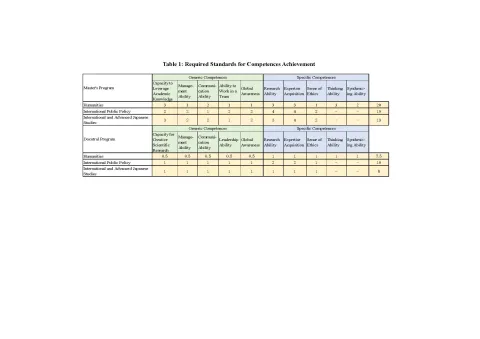How to Evaluate Competences Achievement (For Students)
1. Introduction of Competency-Based Education Programs to Graduate School
In April 2020, University of Tsukuba graduate schools fully converted into a new system of degree programs. Our new degree programs have introduced competency-based education, where a master’s or doctoral degree is granted to a student judged to have attained the level of competences required in the diploma, curriculum, and admission policies of each degree program. The competences are grouped into two categories: generic competences and specific competences. Every student will be required to attain predefined competences to graduate.
Students who belong to the Master’s Program in Humanities will be required to attain 5 generic competences (Capacity to
Leverage Academic Knowledge, Management Ability, Communication Ability, Ability to Work in a Team, and Global Awareness) and 5 specific competences (Research Ability, Expertise Acquisition, Sense of Ethics, Thinking Ability, and Synthesizing Ability).
Students who belong to the Master’s Program in International Public Policy and Master’s Program in International and Advanced Japanese Studies will be required to attain 5 generic competences (Capacity to Leverage Academic Knowledge, Management Ability, Communication Ability, Ability to Work in a Team, and Global Awareness) and 3 specific competences (Research Ability, Expertise Acquisition, and Sense of Ethics).
Students who belong to the Doctoral Program in Humanities will be required to attain 5 generic competences (Capacity for Creative Scientific Research, Management Ability, Communication Ability, Leadership Ability, Global Awareness) and 5 specific competences (Research Ability, Expertise Acquisition, Sense of Ethics, Thinking Ability, and Synthesizing Ability).
Students who belong to the Doctoral Program in International Public Policy and Doctoral Program in International and Advanced Japanese Studies will be required to attain 5 generic competences (Capacity for Creative Scientific Research, Management Ability, Communication Ability, Leadership Ability, Global Awareness) and 3 specific competences (Research Ability, Expertise Acquisition, Sense of Ethics, Thinking Ability, and Synthesizing Ability).
As Table 1 indicates, each Degree Program defines its own Required Standards for Competences Achievement.
2. What is Competences Achievement?
Degree Programs in Humanities and Social Sciences have released a “Curriculum Map” that exhibits competences a student will be able to attain in each course of the program.
For instance, “Shushi Ronbun Godo Enshu (Joint Seminar for Master Thesis)” (1.0 credit) consists of 0.2 credits for Capacity to Leverage Academic Knowledge, 0.2 for Communication Ability, 0.3 for Research Ability, and 0.3 for Expertise Acquisition. “Academic Writing and Research Ethics” (1.0 credit) consists of 0.2 credits for Capacity to Leverage Academic Knowledge, 0.5 for Research Ability, and 0.3 for Sense of Ethics. Students who belong to the master’s Program in Humanities can attain 0.4 credits out of the required standard of 3.0 for Capacity to Leverage Academic Knowledge and 0.8 out of the required 3.0 for Ability to Research after mastering the above two courses.
Regardless of their course grades, students will be judged to have fulfilled the required competence when the total of competence values of courses reaches the Required Standard for Competence Achievement (Table 1). In addition to the regular courses, activities such as conference presentation, teaching assistant, fieldwork, and internship can be certified and counted toward the required Competence.
3. How to Carry Out Competences Achievement Evaluation
Students are expected to self-evaluate their own status of Competence Achievement by (i) filling in the course competence values which they attain on a “Competences Achievement Evaluation Sheet” using the “Curriculum Map,” and (ii) consulting with their academic advisor about Competences Achievement semiannually (in September and March). Students should file the “Competences Achievement Evaluation Sheet” and submit it to the Program Office, adding new data every half year. In addition, students are required to self-evaluate their status of Competence Achievement and consult their academic advisor when they face the intermediate scrutiny of their master’s thesis or preliminary screening of their doctoral dissertation. Students who wish to graduate early must have fulfilled the Competences Achievement by the time of qualification.
Please click on the link below to access the “Curriculum Map”.
https://www.hass.tsukuba.ac.jp/en/curriculummap_en
◇Curriculum maps
https://www.hass.tsukuba.ac.jp/en/curriculummap_en
◇Course guide *Japanese only
https://www.hass.tsukuba.ac.jp/en/guide_en
